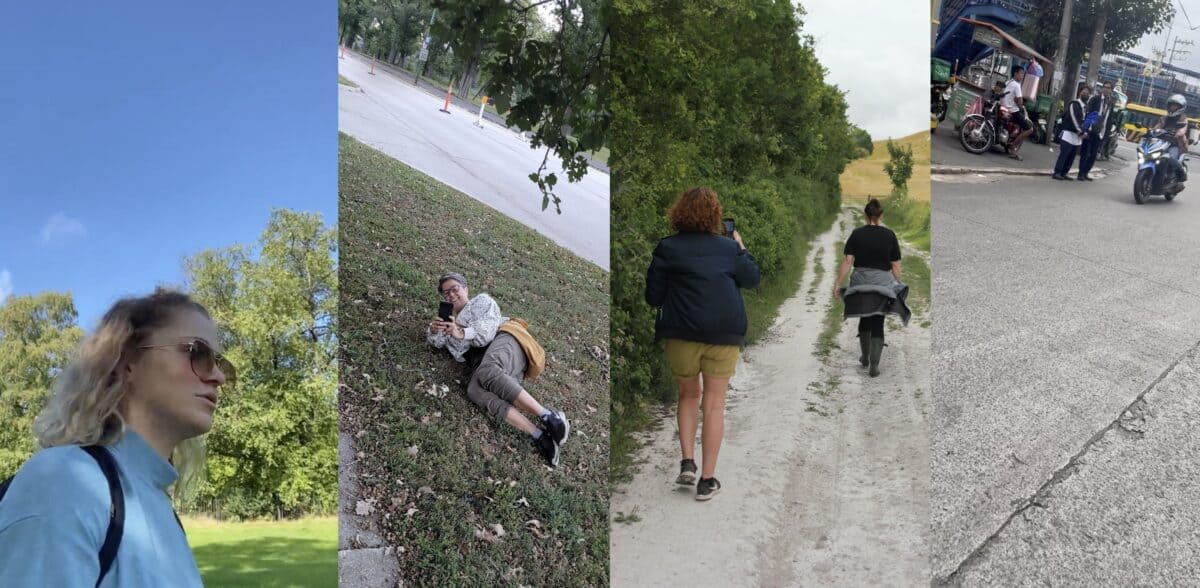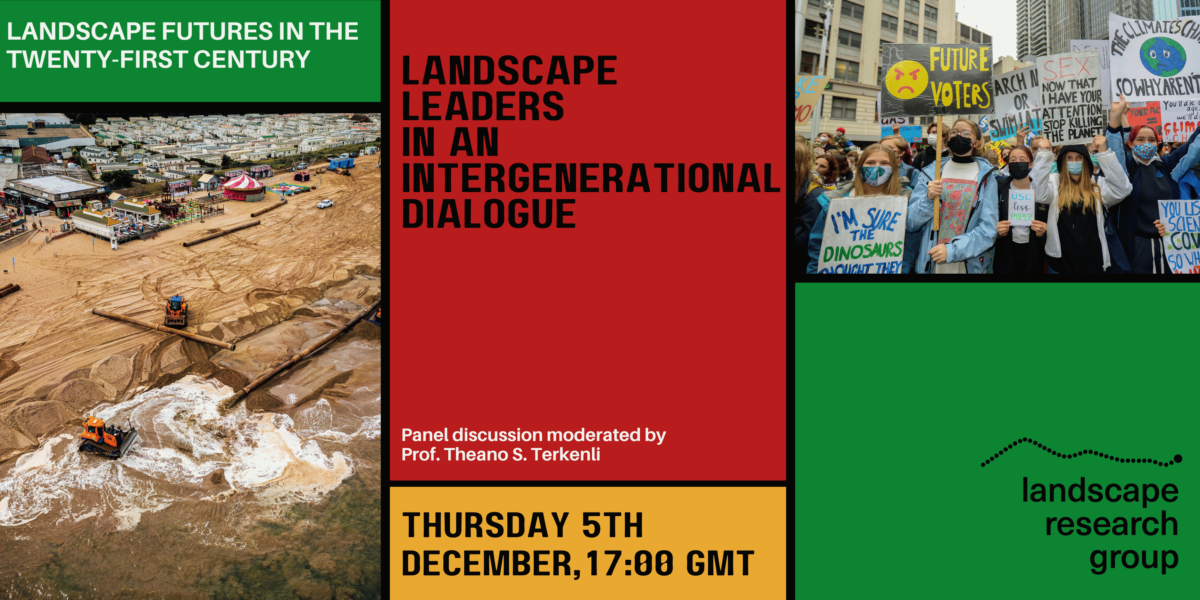Learning and Reflections from a Community Soil Clinic Pilot Project
Hari Byles & Elena Luciano Suastegui
Abstract and how to read this piece: This piece presents words and voices from project members, participants, books, notes, reports and conversations. As a general scheme, indented text indicates voices from participants or readings, and the rest are voices from the clinic members. These many voices tell a story of the pilot phase of the Soil Clinic, punctuated by ideas, reflections, scattered thoughts and open questions. By sharing fragments of our conversations, quotes, meeting minutes and feedback forms, we wish to share an emergent account of soil health, collective learning, the need for healing, and community connection. This contribution aims to show what is needed to collectivise soil learning, and sensing from an anticolonial perspective, through opening everyday spaces which contest the power dynamics which enclose knowledge, land, and health.
From 2022-2024 The Soil Clinic has been developing an emergent methodology for DIY community-based soil testing through conducting a pilot project and regular learning circle which took place across four community growing spaces in London. In December 2024, we launched our website, which contains a growing archive of our work, organising and collective learning. You can visit our website and read about our work in more depth here: soilclinic.cargo.site
The Soil Clinic’s core values are rooted in a commitment to landscape justice, which for us includes: social justice, land justice, soil justice, food justice, racial justice and disability justice. Through this commitment we seek to deepen our understanding and practice of care between people, land, soil and ecology. In particular, we set out to attend to the ways that knowledge and power are unequally distributed between institutions and communities of soil-carers, to take a decolonial approach, and ultimately work towards shifting power and knowledge in relation to soil care
As part of the pilot project we focussed our energy on forming systems and structures to support the development of our collective; selecting community gardens to collaborate with; and subsequently delivering six Learning Circles over one year, with 61 participants attending. The images below tell a story of what we did.
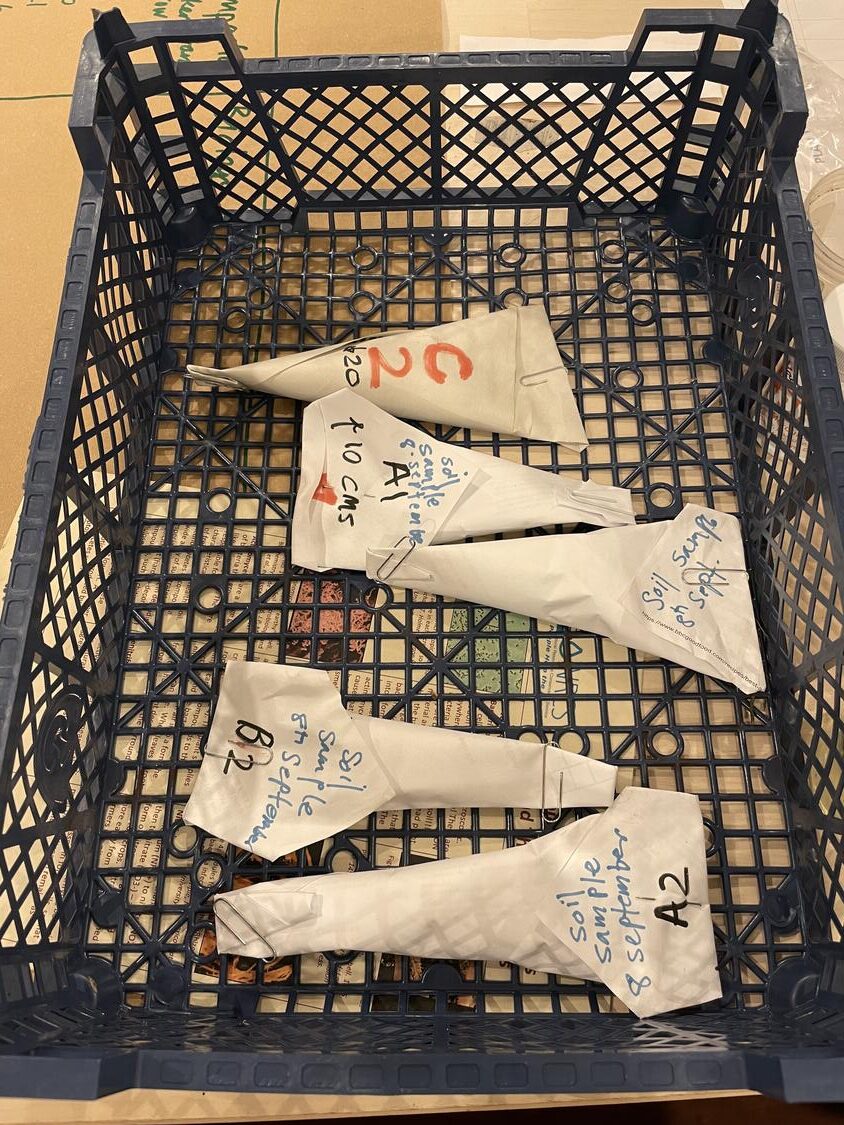
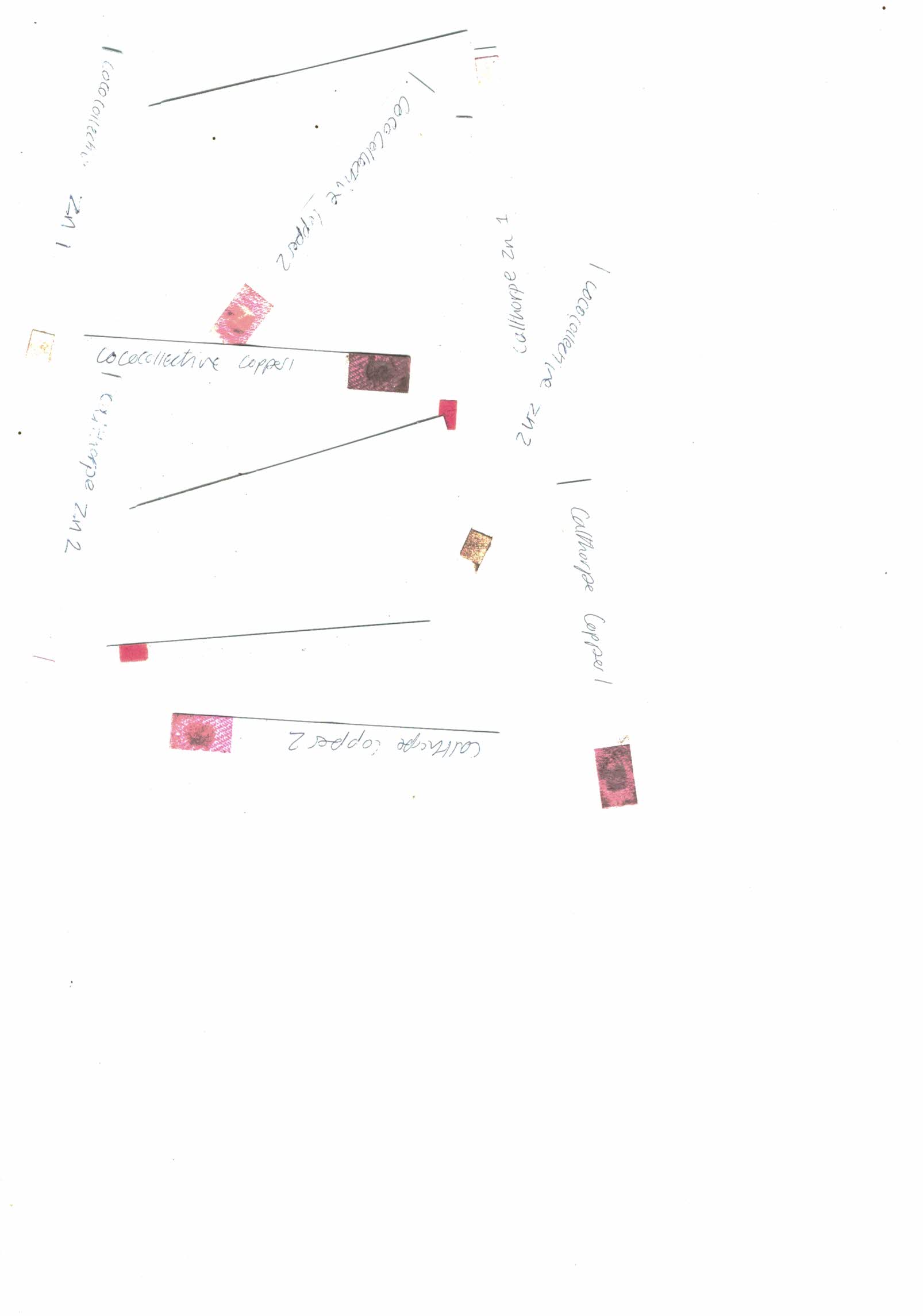
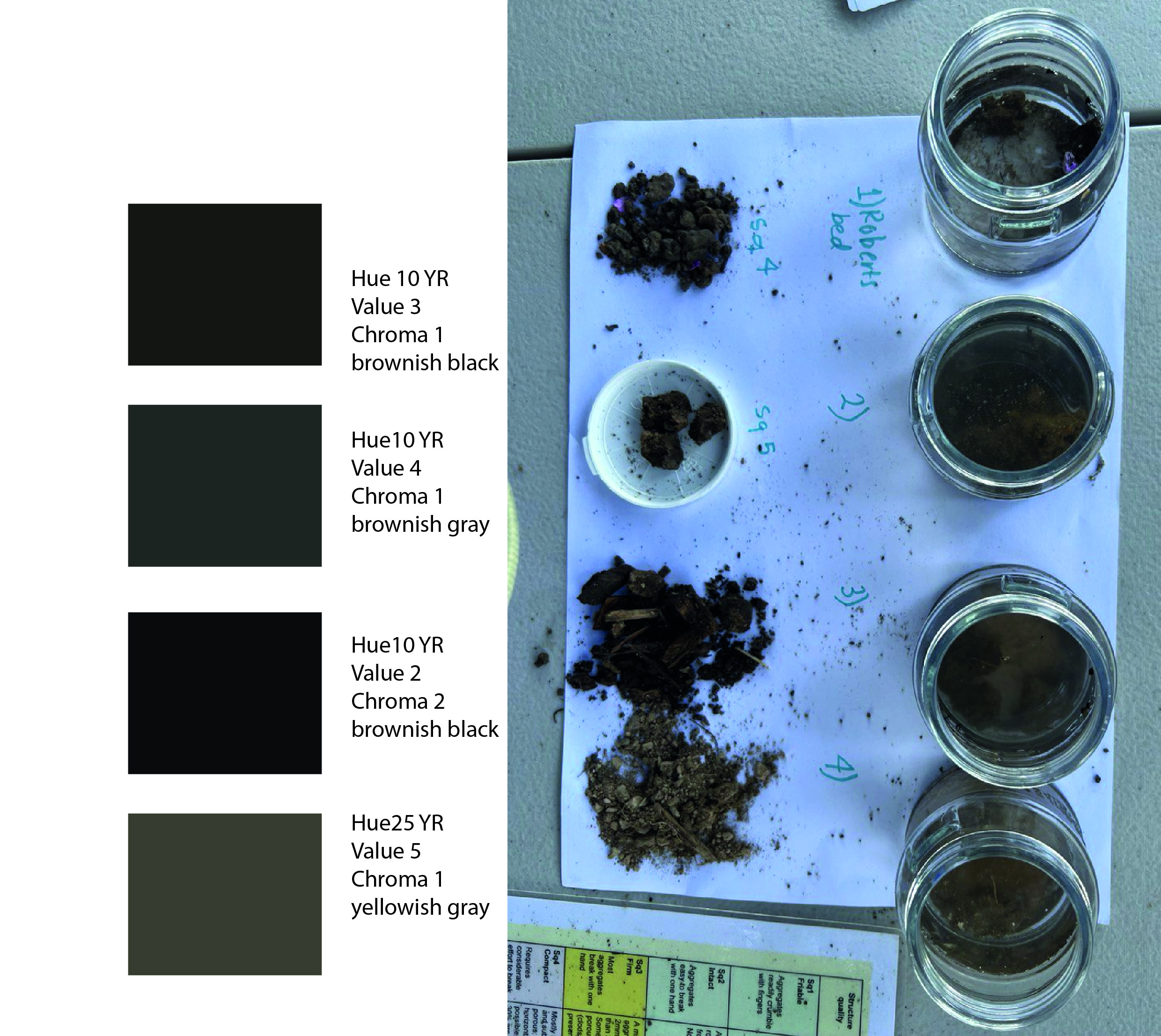
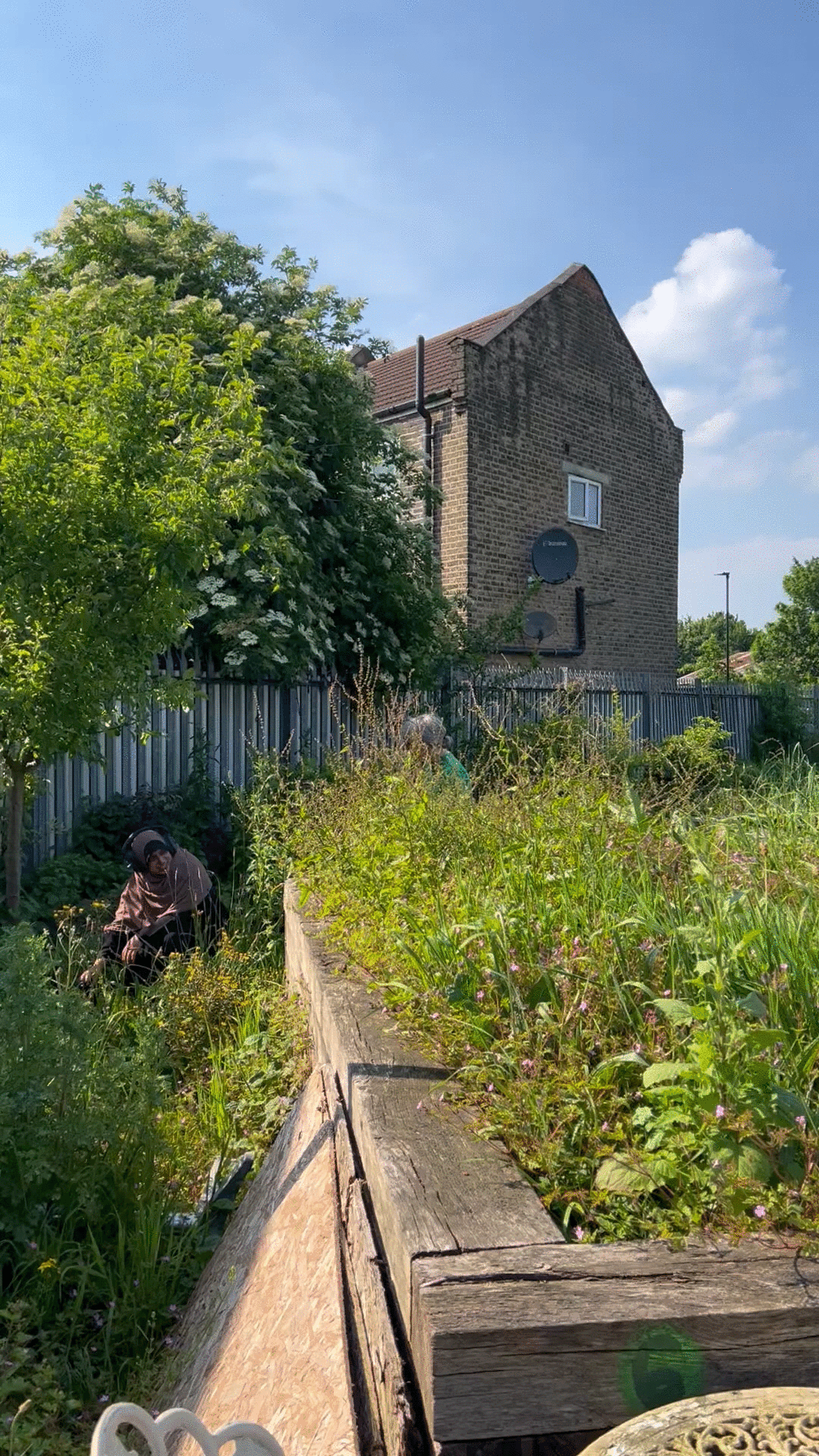
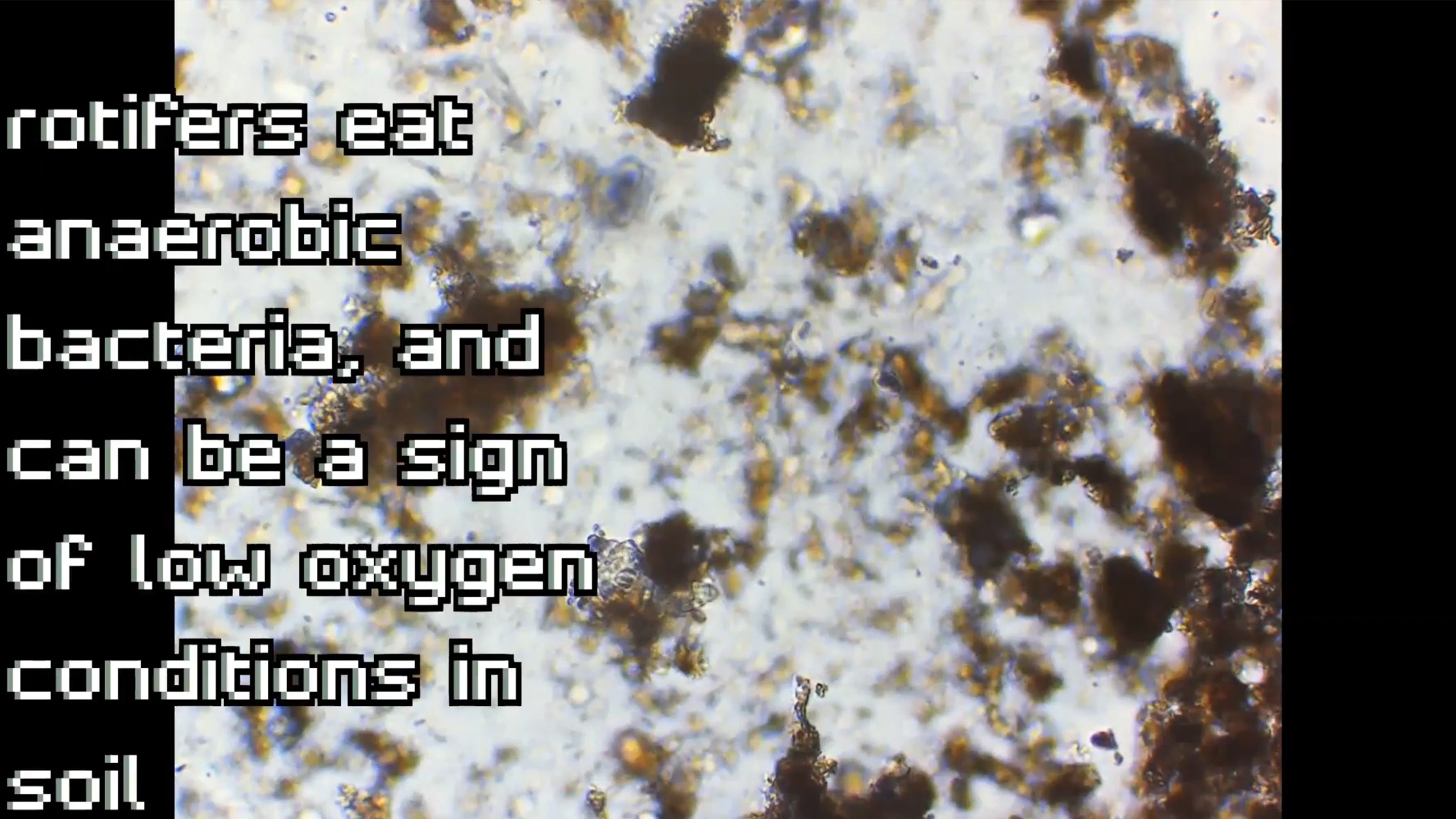
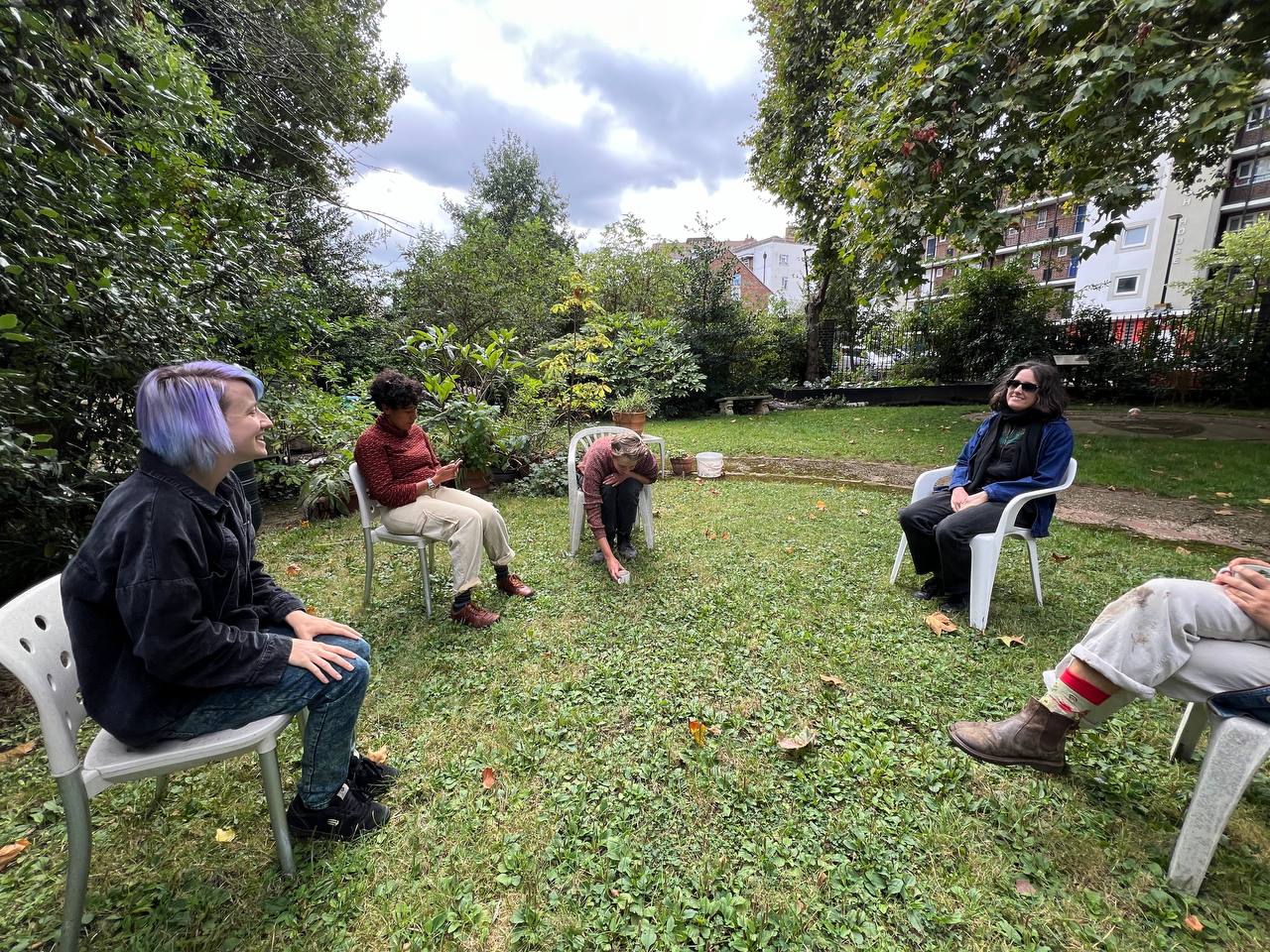
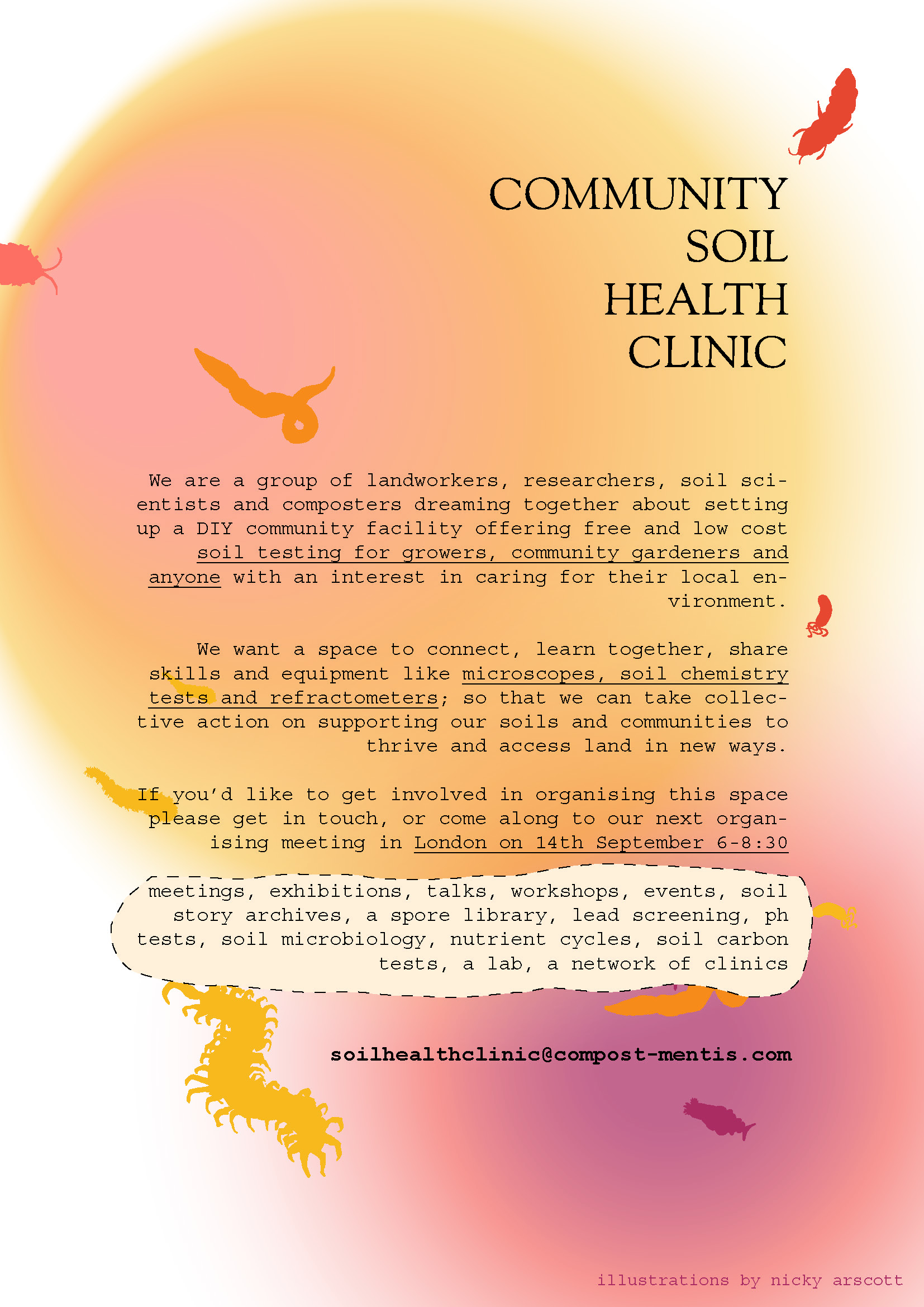
Whilst staying immersed in the ongoing composting of our learnings, many new questions wriggle to the surface… revealing the sticky unclarity of relating to soil through a decolonial lens.
It is often taken for granted that the opposite of a question is an answer; there is a cosmic, platonic double-step logic about it. Black is to white, as night is to day, as cats are to dogs, and questions are to answers. But what if questions are not free-floating formations that are summarily resolved with answers? What if questions are not made only of words? What if questions are material things, speciated and tactile, with body parts, particular histories of their own, affective accompaniments, genealogical ties, and burial grounds? What if questions are like guests to a home – to be welcomed, catered to, dusted up, considered affectionately, spoken with, and put to bed? And what if giving an answer is sometimes the ethical equivalent of slamming a door on the face of a guest as soon as you’ve said hello?
Akomolafe, B. (2022). How do we respond to crisis?
Mirroring Bayo’s approach to questions, we welcome and sit with all the questions that have emerged and will emerge as this project unfolds.
Throughout the clinic’s pilot stage, we brought active care and attention into each moment of our work, producing detailed notes during meetings and workshops, recording the voices and learning journeys of participants and our collective. Our work together was/is an unfolding inquiry into how the organisation of the clinic itself could respond to the needs of food growers and the soils they/ we are connected to.
People will need different things in order to be able to show up, how do we make the resources we have respond to different needs in a more dynamic way?
Notes from Meeting Minutes, 1st March 2023
The work we have conducted sits within the wider landscape of our busy city, full of life, death, distractions and injustices. This creates many challenges and tensions when collaborating, and from this… so much learning. Starting from this collective drawing (below), made by the organising circle members in our last meeting, this text draws out questions from each phase of our work. The drawing shows our experiences, feelings, and struggles from the past two years, in the form of a timeline, resembling a river running through a vast city. These questions follow a collective chronology while raising relevant questions for past and future manifestations of the clinic. The timeline starts with the first open meeting on the left side of the image, that is later followed by a series of learning circles and workshops taking place across community gardens in London.
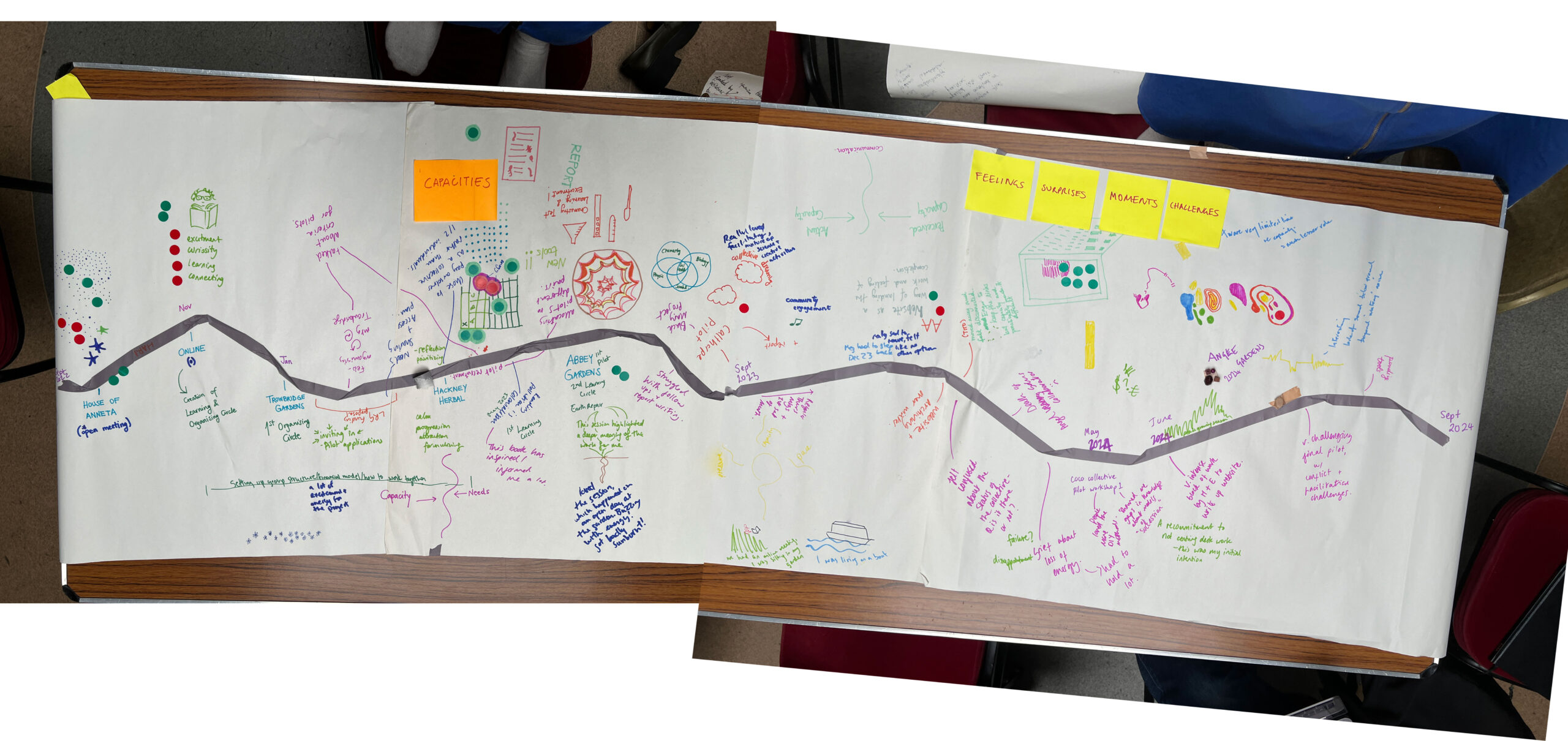
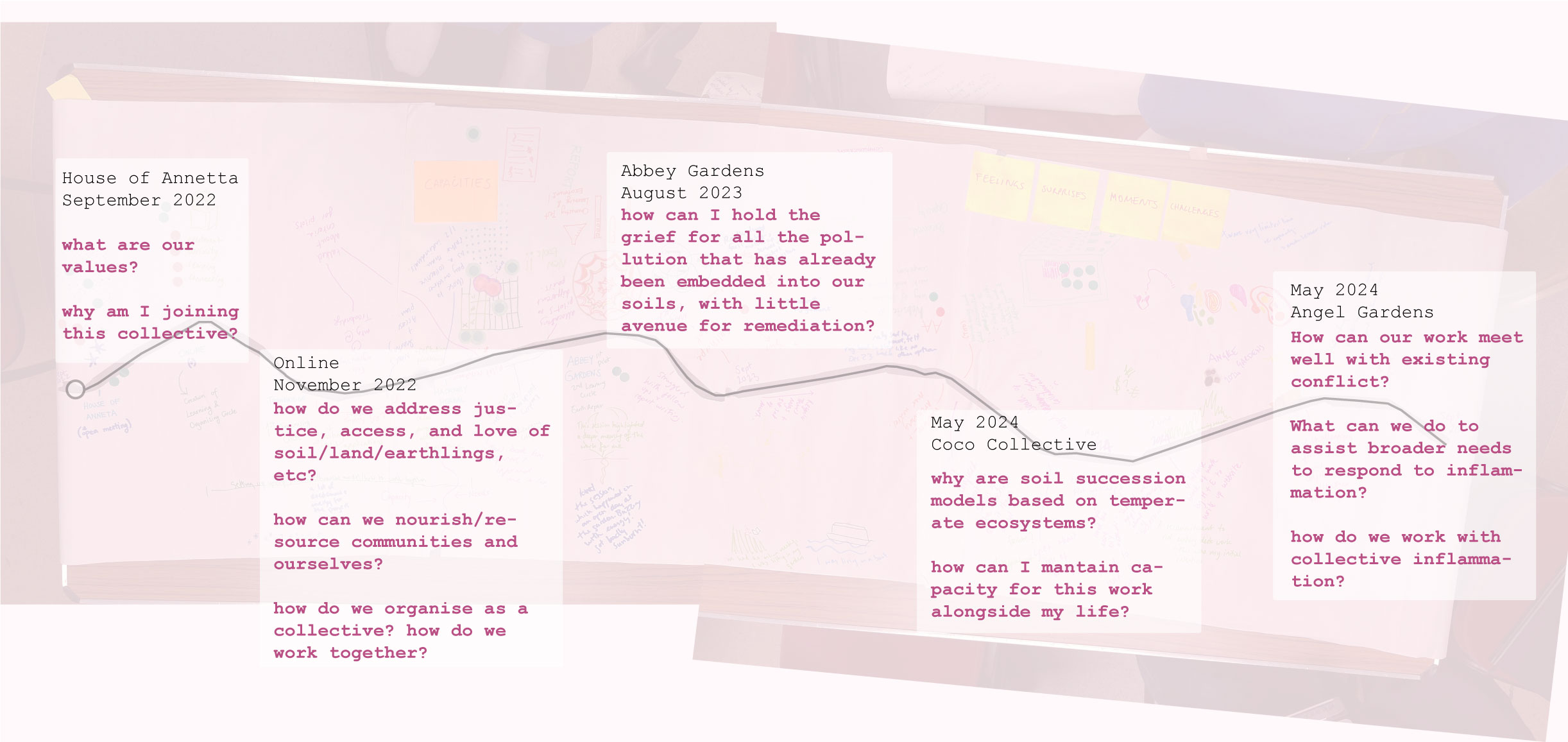
In the following sections we share some key events of the Clinic’s learning journey. These events took place in community gardens alongside the communities that take care of them. Each event was part of a learning journey where we posed and aimed at reflecting on the questions from Figure 12. The questions and responses come both from individuals and collectives, the community gardens and the soil clinic; from participants and organisers.
OUR FIRST OPEN MEETING
At House of Annetta: a social centre in East London, set up with the intention for learning about the ways in which ownership of land shapes our lives and the world around us.
What values are important for this work?
We talked about the importance of centering Traditional Ecological Knowledges (TEK) in what we do, as western science is just one way of ‘knowing’ soil. For example, using microbiology to open up our imaginations and help us relate to soil in new ways, reimagining and reframing dominant narratives (First Open Meeting).
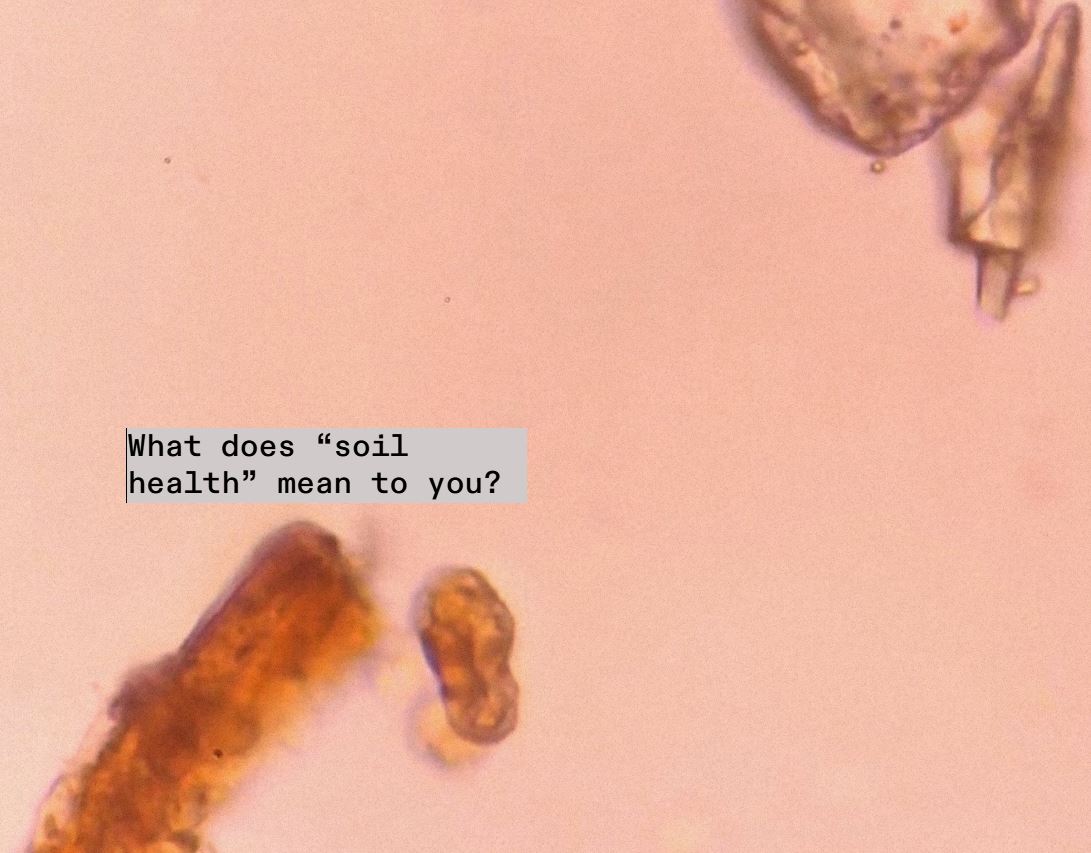
Why am I joining this collective?
We discussed the predicament of most gardeners who often don’t know the full story of their soil and so build raised beds or put down membranes to manage the potential risk. Attendees shared how having readily available soil data and testing could change the ways that gardens grow and the kinds of infrastructures needed (First Open Meeting). Some individual responses to why am I joining this collective? were “Making soil testing and soil knowledge more accessible, open source, tangible, useful + relevant to people who grow / forage food and medicine”, “Deepening understanding & relationships between people, land, soil & ecology”, and “ Making experiences of awe about our surroundings accessible to more people”. As Figures 4 and 5 show, the collective boards were populated with responses, questions and offers of support.
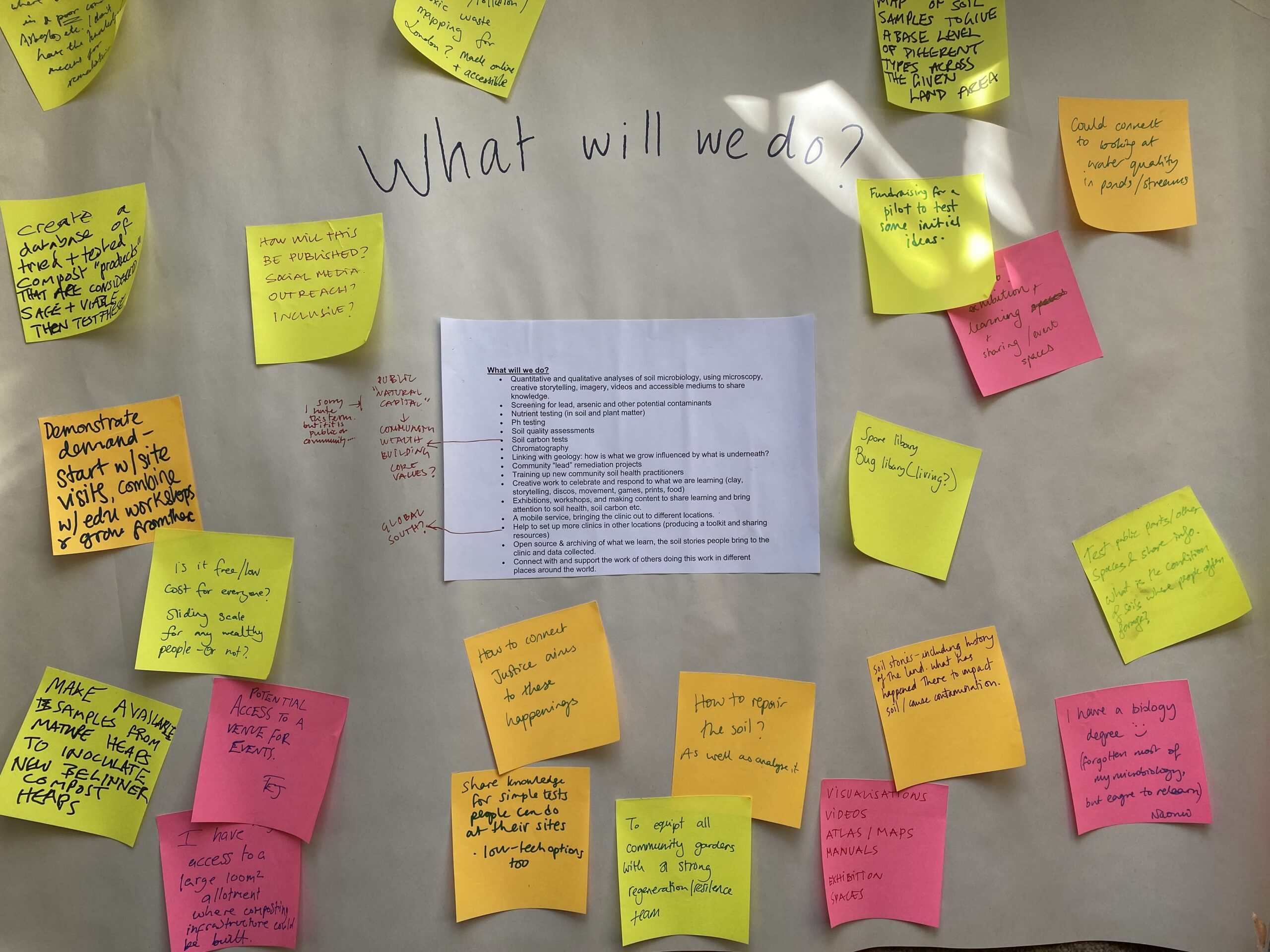
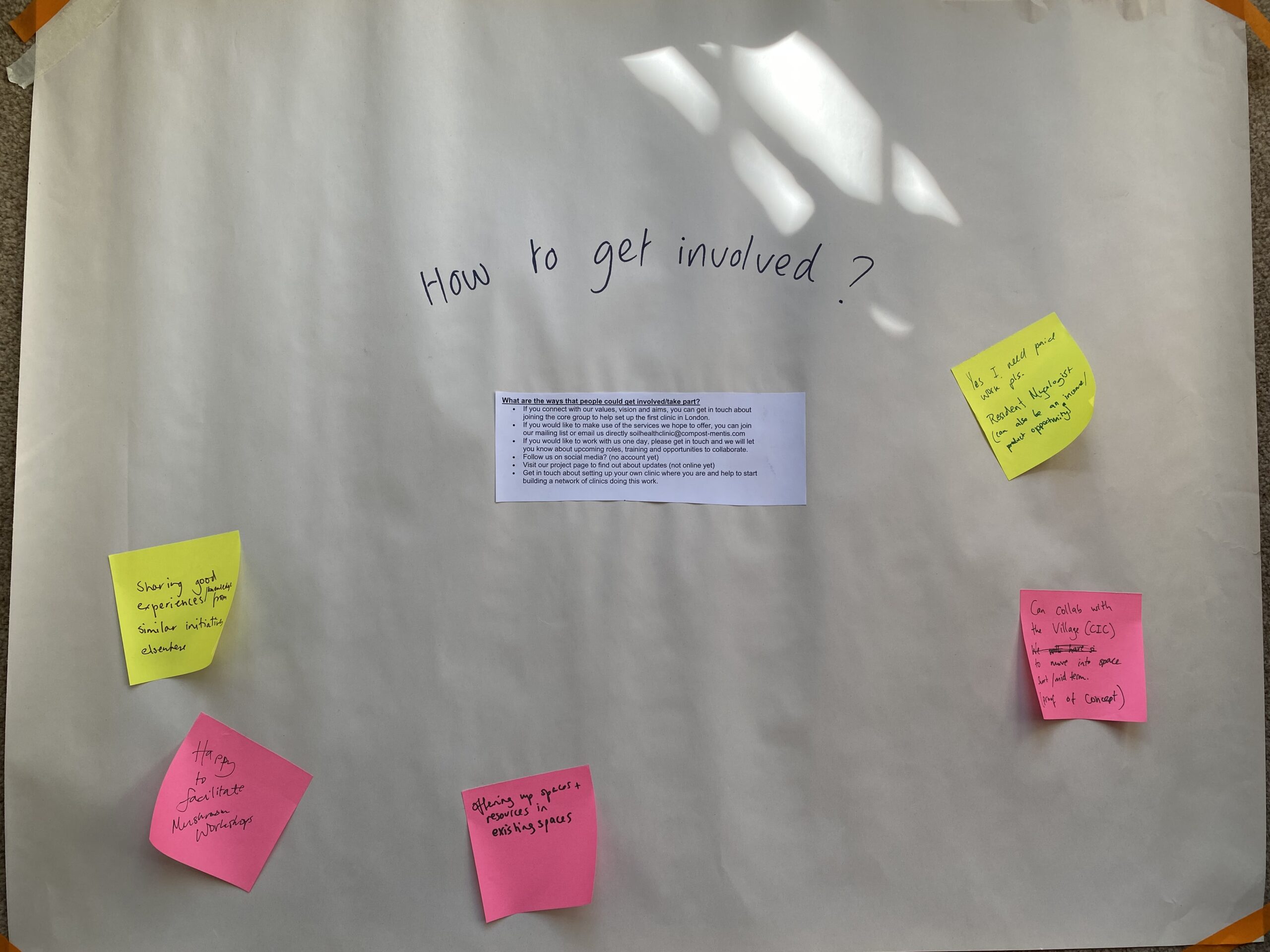
STARTING OUR LEARNING JOURNEY
At Abbey Gardens: a community garden in Newham, East London; offering an open-access park and harvest garden situated on the site of a 17th Century Abbey. The garden is used throughout the seasons as a place to pause, to grow, to meet, to make.
After gathering all the visions and dreams from our first open meeting and subsequent organising meetings, we decided to start a regular “learning circle”, a space to learn and share with pilot project participants. In our pilot workshop at Abbey Gardens, we read Earth Repair by Layla Darwish (2013) and raised questions from the book for our work in the clinic
The following question emerged: “How can I hold the grief for all the pollution that has already been embedded into our soils, with little avenue for remediation?”. In this pilot we noticed a deep need for healing and grief tending, as well as the need for robust welfare and support systems that respond to the subject matter and anxiety/fear connected to this. On the practical side, we also recognised the material and ethical challenge of using chemical reagents for testing soil… Where do these chemicals come from, and where do they go after we’ve used them? This challenge has also been raised by Max Liboiron (Métis / Mischif) in their work testing pollution in marine environments. Liboiron’s commitment to anti-colonial methods has shaped how and what they test through their lab CLEAR (Liboiron 2021).
The participants of the workshop expressed awareness and appreciation for the complexity of testing and repairing soil. People also felt that they got to explore the topic of soil pollution more deeply, reading things they would not otherwise have read, and formulating new questions and enquiries:
The space got me to read a text more deeply and faster, with greater motivation. Usually, I would not find the time from my busy life to sit with a text like this.
Learning Circle Participant
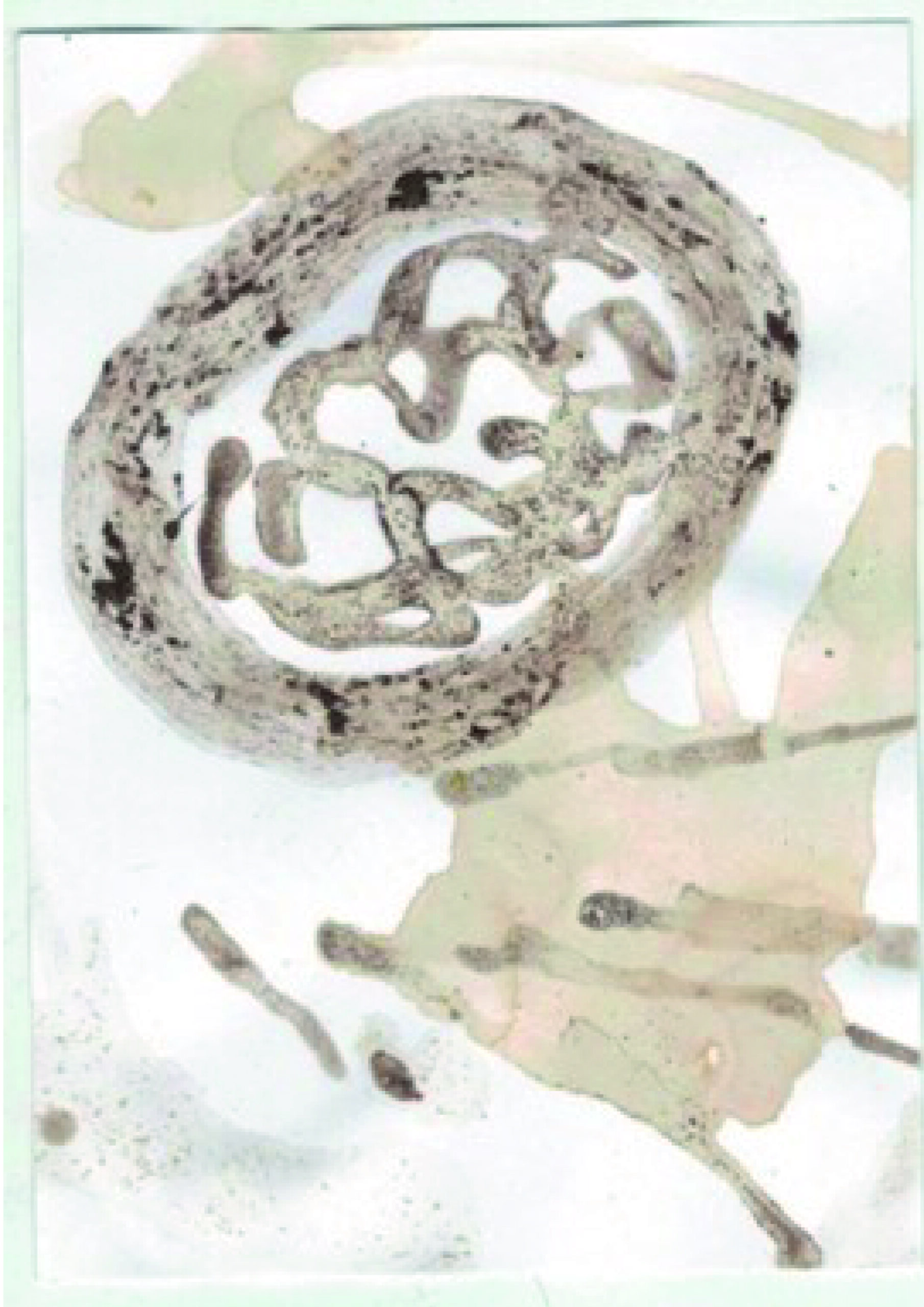
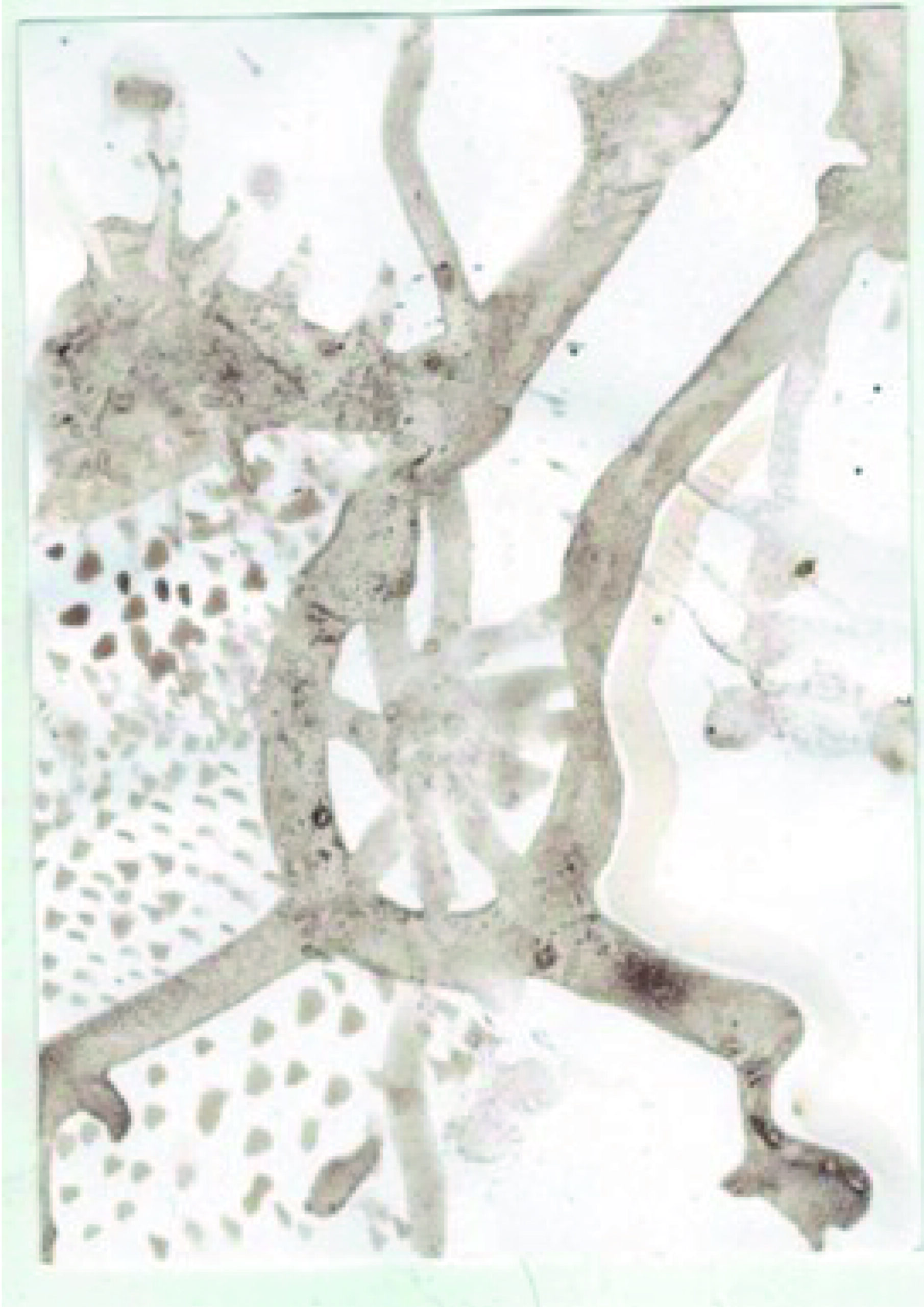
Figs. 16 & 17. Soil Portraits, 2023, Drawings Made by Abbey Gardens pilot participants
OUR SECOND PILOT WORKSHOP
Calthorpe Community Garden, an inner city community garden and centre, existing to improve the physical and emotional wellbeing of those who live, work or study in Camden and surrounding areas. Supporting children, the elderly and vulnerable groups in the community, they offer a range of participatory and supervised creative, wellbeing, horticultural and sporting activities.
Calthorpe is my home
We are all going to be soil at the end of the day, so let’s look after each other
Participants of the Calthorpe pilot
Calthorpe is quite an undervalued, overlooked and rare space, where community, connection, conversation and eating together is central. Its importance became clear during the pandemic, and there is a strong belief that the skills and knowledge around being in community are essential tools for future healing and transformation. This resonates with what we are trying to achieve with the soil clinic, where organising collectively has become a key, and most valued method for understanding and relating to soil.
The pilot workshop at Calthorpe included observations of soil microbiology, compaction testing, and lead testing. The results brought a sense of connection to the garden’s history, to each other and some form of relief to know the soil was healthier than expected. At the end, we led a conscious dreaming exercise to facilitate participants to imagine a possible future for the garden, where the soil and communities are thriving, and the world around has changed for the better.
I learned about microorganisms, some of what makes a healthier soil, how to take samples, how important is to connect in a more emotional level (or being reminded)
I really liked the atmosphere and the messages behind the space. It’s such a nice vibe.
Relaxed, caring facilitation.
Safeness, calmness, inclusivity, space for questions and curiosity, meditation, exercise and checkout.
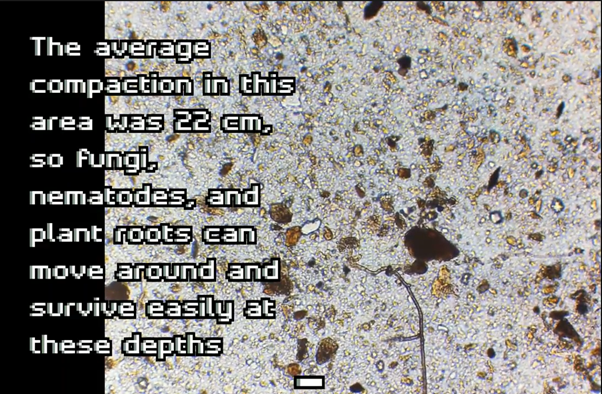
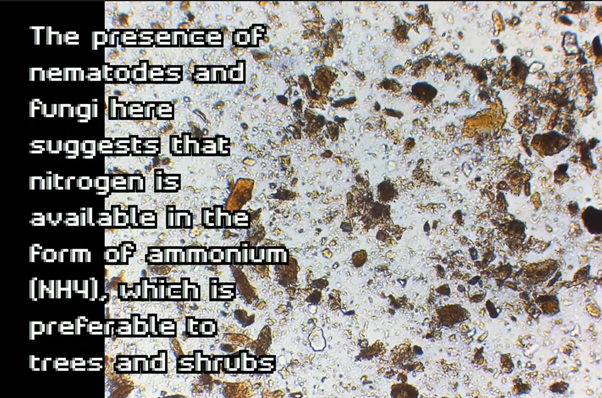
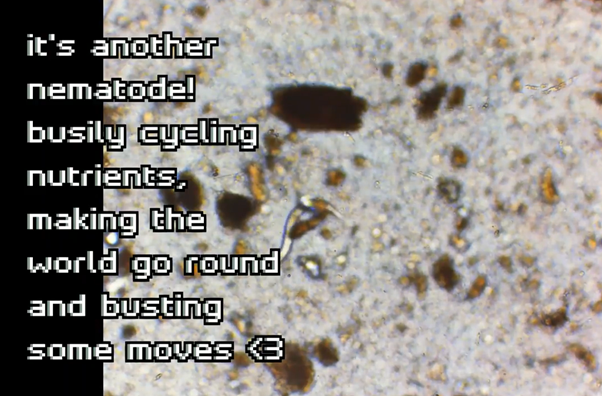
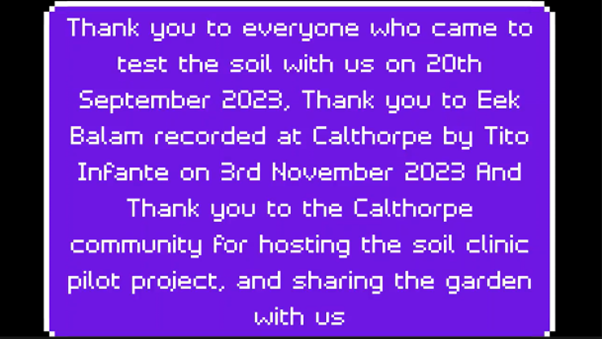
Figs. 18, 19, 20, 21. Soil Microbiology Observations, Reporting, and Learnings, 2023, Hari Byles
Calthorpe Garden was also a place to test and reflect on pollution. In this space, the words from a previous Learning Circle, where we read Pollution is Colonialism raised questions that were relevant to our findings and how the clinic positions itself when measuring, toxicity, and thresholds of pollution
The lead presence in the food growing area was highest, and in the sunken garden lead was detected deeper in the soil […] Before 2014, the UK soil guideline stated that anything up to 450mg of lead per kg of soil was safe. This has since been lowered to 80mg/kg, which could be a cause for concern at Calthorpe. This way of assessing the potential harm of contaminants, represents what Max Liboiron (Métis/Mischif) calls the “threshold theory of pollution” (Liboiron 2021, 5), Liboiron argues that “this way of governing pollution is relatively new, but it is premised on an old colonial system of land relations where the land is a Resource” (2021, 39). Such ‘thresholds’ of harm, decided by western dominant science in cahoots with governments and polluting industries, assume entitlement to Land, bodies of water, plants, creatures, spirits etc. as “sinks” that are there to receive waste generated by capitalist production, up to a certain “acceptable” threshold. The numbers that are arrived at are influenced by all sorts of factors (measures of metabolism, assimilative capacity, changing technologies for measuring, understandings of these processes, and understandings of public health impacts) which change over time, as we can see in the example above of lead in soils whereby the threshold decreased by 82% from one year to the next. Such methods don’t consider the complexities and questions around relating to the Land, relevant to communities at Calthorpe. We need to find ways of thriving, relating and being on the land in the presence of these harmful inheritances. Through this pilot process we are trying to work out how to do this through the methods, values and approaches we adopt …” Calthorpe Pilot Preliminary results.
Our results and reflections from this pilot led us to look into forms of working and healing with these soils and our future encounters with toxicity. There is some grassroots research that shows how lead can be remediated in different ways by bacteria and fungi as well as plants like sunflowers (Darwish 2013). Other recent research has shown that in urban food growing areas where lead levels are above the recommended thresholds, the lead that shows up in the plant matter and bodies of growers is very minimal. The movement, quantitative and qualitative dimensions of heavy metals in soil is complex and hard to measure, and requires complex solutions and responses.
As this is a pilot study we are still experimenting with different methodologies for testing the soil, and are not yet sure how reliable the reagent tests we used are. We have since calibrated our results with a professional lab test, which detected even lower lead levels than our tests picked up. This raises more important questions, and will require further calibration and cross checking.
OUR THIRD PILOT WORKSHOP
At Coco Collective/ Ital Community Gardens: An Afro diaspora led growing space in Catford, with a focus on regenerative permaculture methods to grow culturally diverse foods and healing herbs. They don’t use chemicals, animal by- products, or peat. Pan Afrikan and Ital are values that flow through the gardens from soil to plate and governance to events.
There were many questions emerging from and out of our 3rd pilot workshop at Coco collective. Members of the garden shared the importance of collectivity and emotional support, repeating their motto to: “Work in a collective to achieve your objective”. During the session there was a real appetite and excitement about learning together, and having lots of time to go deep, and share learning with one another, as well as joy in getting to do practical stuff like digging holes and counting worms.
There seemed to be much more interest in low-tech testing methods, using everyday kitchen and garden tools like apple cores, trowels, shovels, jars, tape measures, garlic crushers, kitchen knives etc. There was lots we were able to learn about the soil through simple DIY tests, like soil texture tests, compaction tests and worm counts.
Our methods are often a little messy… and from this, there is an emergent quality, where participants start to direct the testing process collectively; “let’s go over here, and try this”, “dig here”, “what if we do that…” For example, deciding to rename the worm count the “wiggle test”, and then including other creatures in the count like woodlice and centipedes, and combining this with a collection of soil plastics (which turned out to be an excellent way of observing the relationship between soil biota and microplastics in soil). There is something so valuable, relational and intuitive about this way of doing science together on the land.
Our approach seeks to interrupt the desire for singular experts with all the answers and instead facilitates spaces of collective inquiry and questioning. These can be spaces where a different kind of expertise can emerge, and be held in common. Communalising our knowledge, acknowledging what we don’t know and marvelling at complexity, is therefore a key intention which drives our learning and organising. It has been reassuring to hear that this is starting to be felt by our collaborators and workshop participants.
What did you enjoy most about the space?
The hands on element of the testing and getting our hands dirty
I learnt lots of things I didn’t expect to learn and don’t always get the chance to look at these things so closely. Thanks!
Really lovely and welcoming group and space felt so nice to be outside.
I enjoyed the practical tests and learning about the complexity of soil.
OUR FOURTH PILOT WORKSHOP
Angel Gardens: A small community garden situated on an ex-industrial site to the side of the North Circular road and in the shadow of the Edmonton Incinerator, known for its transgressions on air quality. They grow vegetables and produce in raised beds, and are concerned to know about the potential pollution impact on soil and community health.
Our last pilot brought us to reflect on the limits of what the soil clinic can offer, in contexts where there are active conflicts and struggles over land. We bring these two questions, emerging after our workshop and reading of Inflamed: Deep Medicine and the Anatomy of Injustice (Marya and Patel 2022).
How can our work meet well with existing conflict?
Perhaps we need to get better at working with people who don’t agree with us… for the revolution? This will be something to reflect on further when we reach the end of the project, in relation to our core values of social justice, land justice, soil justice, food justice, racial justice, disability justice and tackling the root causes of oppression.
Having had more time to define our values and the practices they lead to since completing the pilot project, we have articulated a need for conflict resolution and accountability systems to address tensions within and beyond our group. This will look like maintaining a fund for formal conflict mediation (for us and those we work with), and adopting a conflict and accountability process from an allied organisation.
How do we respond to “inflammation” in our bodies, soils and society?
We need to be able to make boundaries around what we can and can’t offer, and to manage expectations responsibly. At the same time, we need to leave space for emergence and adaptation – to be able to meet communities where they are at, and not be too rigid with our plans, echoing Adrienne Maree Brown’s call for “less prep, more presence”.
We are still considering the future shape of the soil clinic, and the extent to which we can support those we work with, to address the relational and emotional struggles that are an inevitable part of being together on the land in these challenging times. To reflect this need for flexibility, complexity, and joy we have decided to name our new lab space “The Wiggle Room”.
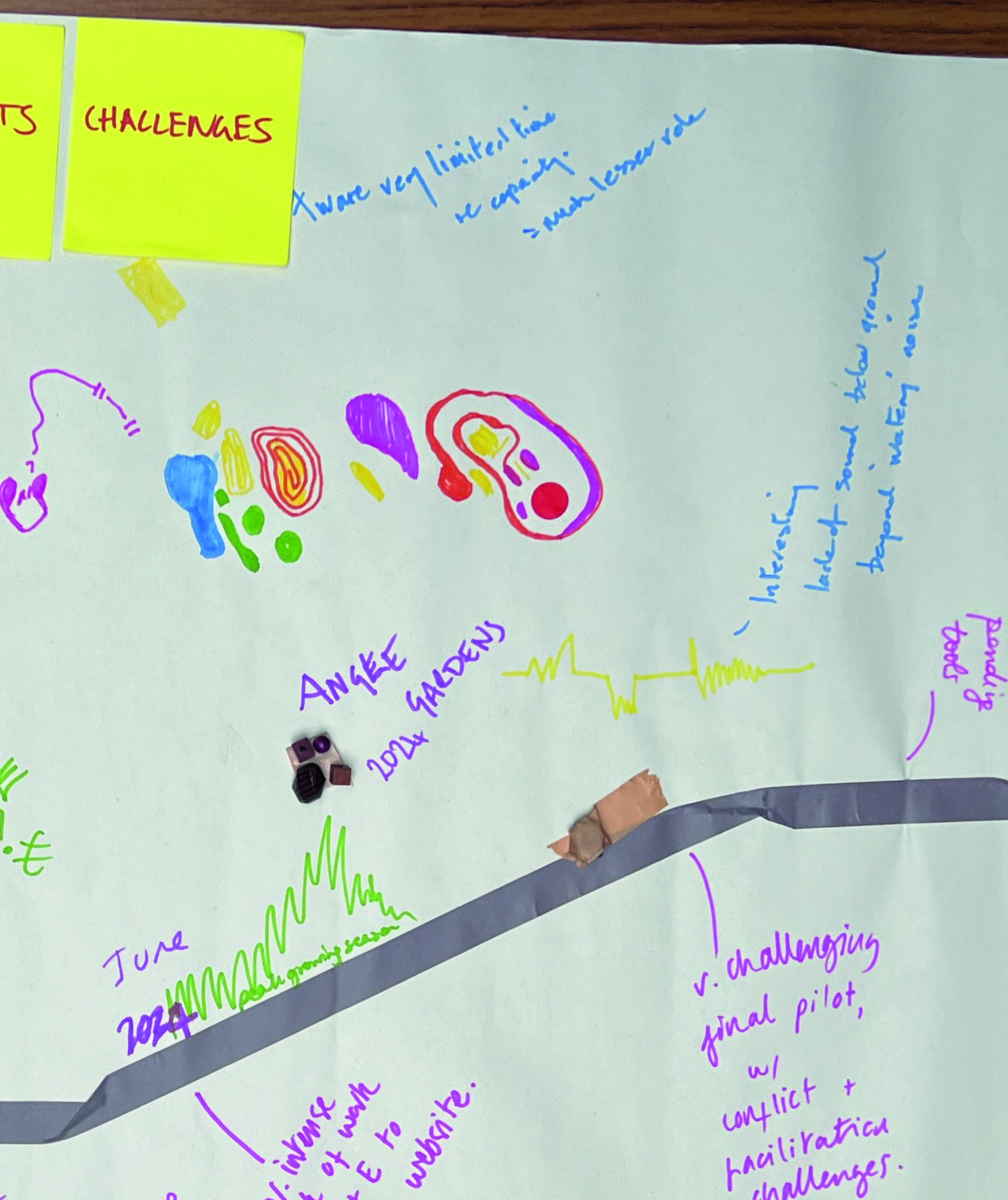
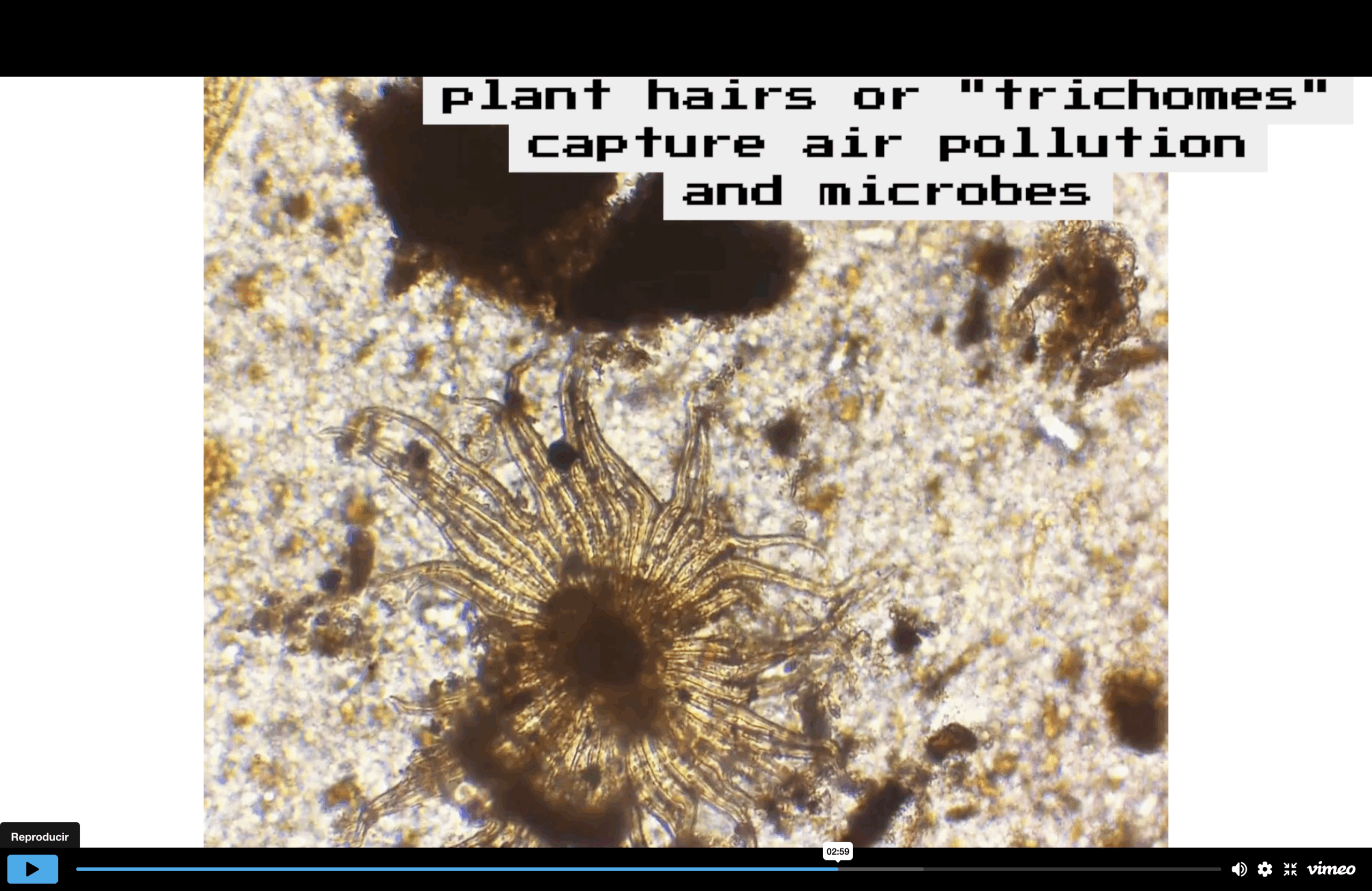
“For every example of colonial inflammation, we offer deep medicine, ways of thinking through how we might find one another through the work of decolonising and through building communities of care (Marya and Patel 2022, 27)
AFTERWORD, OUR QUESTIONS WIDE OPEN
We look forward to the continued evolution of the website, it offers a valuable way for us to communicate transparently about our journey and challenges, as well as sharing useful resources for communities and individuals who want to learn more about their soils, whether that be in collaboration with us or independently. These multiple voices and questions remind us of our first meeting’s discussion about how we embrace Traditional Ecological Knowledges (TEK), holding space for different knowledge practices to speak to each other.
Collective care has been central to this work… As we began to work together we asked each other the following questions:
- What physical/ practical things do you need in order to feel empowered, resourced and supported in your work?
- What social things do you need in order to feel empowered, resourced and supported in your work?
- What emotional support do you need in order to feel empowered, resourced and supported in your work?
- Are there any other access or support needs you would like us to be aware of?
We continue to ask new members, entering the collective about their needs, developing our systems, rhythms and projects in response to different members’ capacity and needs.
“There was an intention for the community to be leading the work, but it became really impossible for the food growers in the group to participate in the organising during the growing season.
There is a phenomenon here about actual and perceived capacity.
E.g. in my ideal life I want there to be space for this, but I don’t have this in my actual life…
Capacity isn’t just about hours… it’s another kind of energy.
Fear of disappointing people etc. can mean that we aren’t honest about capacity.
Craving stability and knowing what you would have each month.”
The clinic in its many meetings, workshops, writings, and creative outputs, encompasses a collective desire to reflect deeply on the politics of care and health across ecosystems. The words of “Pollution is Colonialism” continue to inspire us in this endeavour: “I’m always glad when people raise a fist against the injustices of systems, including pollution and its sciences. But I’d much prefer people to pick up a shovel – or a microscope – with the other hand and get to work” (Liboiron 2021, 37)
“Rather than extracting data to take home, own and extrapolate, our practice prioritises the social / qualitative dimension of performing an experiment; putting your hands in the soil, meeting a worm, examining their markings, and being in conversation with each other and the land… There is always so much that escapes us and wiggles away. Maybe this is an important part of ‘knowing’ and decolonising the soil?” Hari, Learning Circle 4
Writing up this text and revisiting our public and internal documentation became a nourishing exercise of recognising and honouring the collective enthusiasm and the richness of our work. We are grateful to the Landscape Research Group, Necessity/ SHED, London National Park City, Wen. / Just FACT and Farming the Future for supporting this process and pushing us to write about it along the way. Thank you also to all members of the organising and learning circles, and all the gardeners who shared their knowledge, soil and questions with us.
We are planning an in-person celebration event in July 2025 in collaboration with The Community Food Growers’ Network in Tower Hamlets, London. If you would like to be added to our mailing list to hear about this or future events and learning circles, please write to us on: soilcliniclondon@gmail.com
https://soilclinic.cargo.site/
The Soil Clinic Collective are conducting soil testing drop in sessions in Tower Hamlets in London from July – October 2025. See poster below or their website for further details.
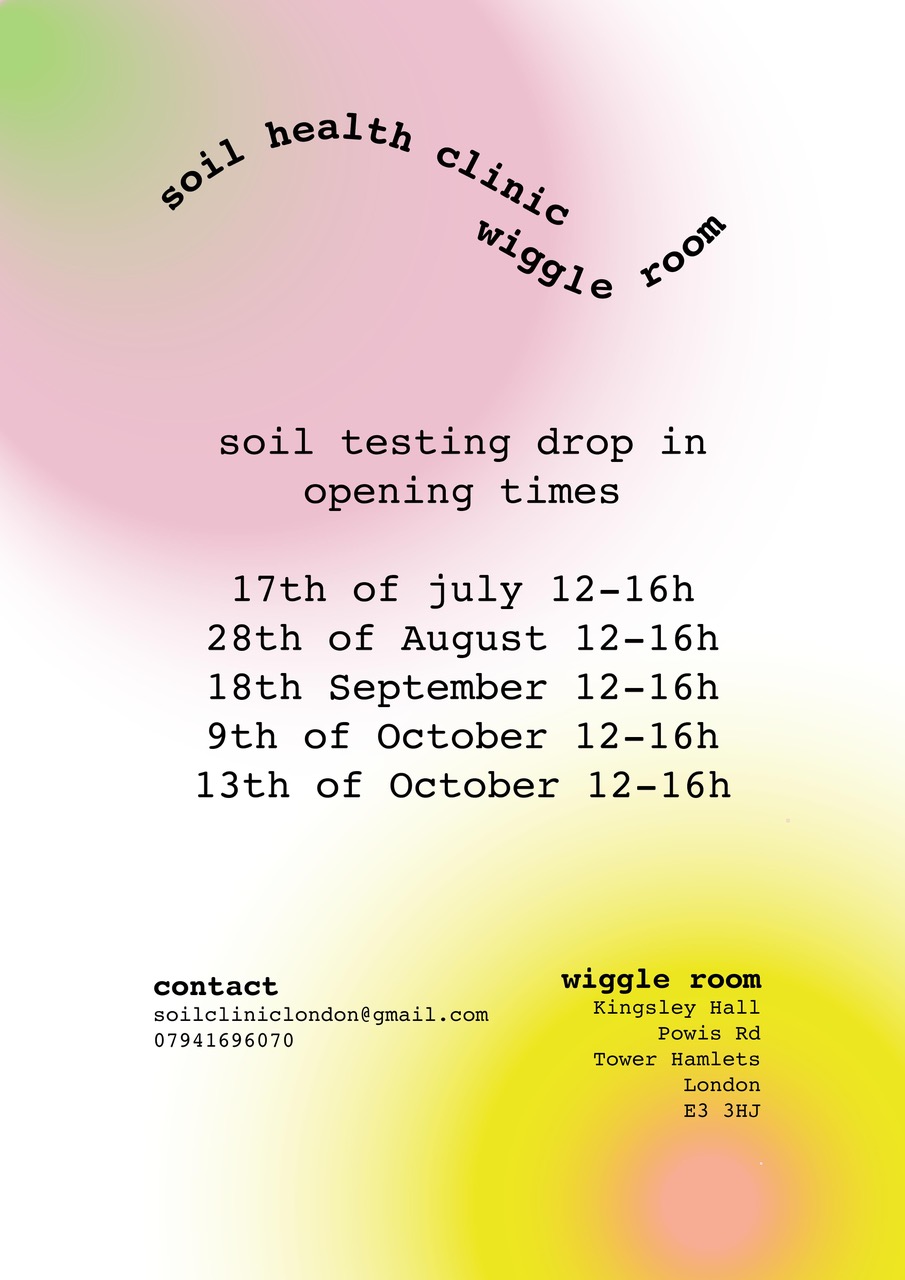
REFERENCES
Akomolafe, Bayo. 2022. ‘How Do We Respond to Crisis?’ 2022. https://www.bayoakomolafe.net/post/how-do-we-respond-to-crisis.
Darwish, Leila. 2013. Earth Repair. New Society Publishers. https://newsociety.com/book/earth-repair/.
Liboiron, Max. 2021. ‘Pollution Is Colonialism’. Pollution Is Colonialism, April. https://doi.org/10.1215/9781478021445.
Marya, Rupa., and Raj. Patel. 2022. ‘Inflamed : Deep Medicine and the Anatomy of Injustice’, 484. https://www.penguin.co.uk/books/321259/inflamed-by-patel-rupa-marya-and-raj/9780141995236.
Related Content
Posthuman Walking Project Podcasts
Posthuman Walking Project Podcasts By Dr Shirley Chubb and Dr Clair Hebron The following podcasts were compiled as part of the broader Posthuman Walking Project, which explores the entanglement of human and […]
Read More >

